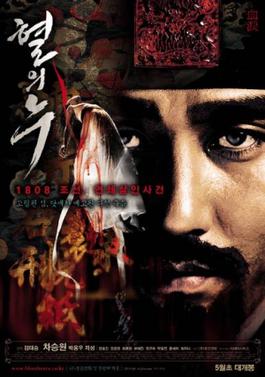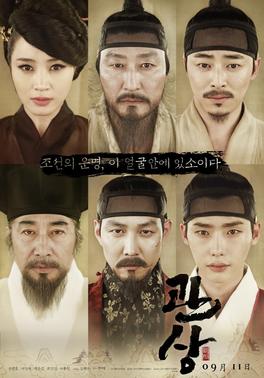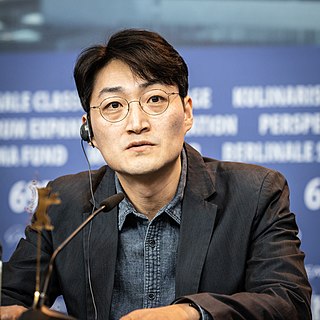
Memories of Murder is a 2003 South Korean crime thriller film directed by Bong Joon-ho, from a screenplay by Bong and Shim Sung-bo, and based on the 1996 play Come to See Me by Kim Kwang-rim. It stars Song Kang-ho and Kim Sang-kyung. In the film, detectives Park Doo-man (Song) and Seo Tae-yoon (Kim) lead an investigation into a string of rapes and murders taking place in Hwaseong in the late 1980s.

Crying Fist is a 2005 South Korean film written and directed by Ryoo Seung-wan. The film had 1,728,477 admissions nationwide.

Blood Rain is a 2005 South Korean period mystery thriller film. A murder mystery set in 1808, it touches on historical prejudice against Roman Catholicism in the Joseon Kingdom. Although primarily a period thriller, director Kim Dae-seung weaves together an unconventional mix of styles—a puzzle-box mystery plot traditionally associated with detective fiction, class-conscious social commentary, lush cinematography, sets and costume design, and a flair for gore.

My Scary Girl is a 2006 South Korean black/romantic comedy film written and directed by Son Jae-gon.

Yoon Je-kyoon is a South Korean film director, screenwriter, and producer. His directorial debut My Boss, My Hero is about a gangster who is sent back to school, while Sex Is Zero has been compared with American Pie.

Choi Dong-hoon is a South Korean film director and screenwriter. He ranks as one of the most consistently successful directors working in contemporary Korean cinema, with all five of his films becoming commercial hits -- The Big Swindle attracted 2.12 million viewers, Tazza: The High Rollers at 6.84 million, Jeon Woo-chi: The Taoist Wizard at 6.13 million, The Thieves at 12.9 million, and Assassination at 12.7 million.

Rough Cut is a 2008 South Korean action film. It is the debut feature of director Jang Hoon and based on an original story by Kim Ki-duk. The film had a total of 1,307,688 admissions nationwide.

Kim Tae-yong is a South Korean film director and screenwriter. After his feature directorial debut Memento Mori (1999), he helmed the critically-acclaimed Family Ties (2006), and the English-language remake Late Autumn (2010).

Architecture 101 is a 2012 South Korean romance film written and directed by Lee Yong-ju. The film tells the story of two students who meet in an introductory architecture class and fall in love. Fifteen years later, the girl tracks down her first love to seek his help in building her dream house.

The Face Reader is a 2013 South Korean period action drama film starring Song Kang-ho as the son of a disgraced noble family who goes around Joseon and a gwansang expert. He is able to assess the personality, mental state and habits of a person by looking at his or her face. His talents bring him to the royal courts where he becomes involved in a power struggle between Grand Prince Suyang and general Kim Jong-seo, a high-ranking loyalist to King Munjong. It is the first installment of the Jupiter Film's three-part film project on the Korean fortune-telling traditions and was followed by two sequels, The Princess and the Matchmaker and Feng Shui in 2018.
Kim Dae-seung is a South Korean film director and screenwriter.
Jo Sung-hee is a South Korean film director. He directed the box office hit A Werewolf Boy (2012).

Chung Ji-young is a South Korean film director and screenwriter. Among his most well-known films are North Korean Partisan in South Korea (1990), White Badge (1992), Life and Death of the Hollywood Kid (1994), Unbowed (2012) and National Security (2012).
O Muel is a South Korean film director and screenwriter. He wrote and directed the award-winning film Jiseul in 2012.

Lee Su-jin is a South Korean film director and screenwriter. His first feature was the award-winning Han Gong-ju (2014).
Mun Che-yong is a South Korean film director and screenwriter. Mun was assistant director of the films All for Love (2005) and Tazza: The High Rollers (2006). His directorial debut Shoot Me in the Heart (2015), starring Lee Min-ki and Yeo Jin-goo, is based on the award-winning novelist Jeong Yu-jeong's bestselling novel of the same name. The film was invited to the 28th Tokyo International Film Festival in 2015. His short film Twins (2007) won the Best Film in A Short Film About Love at the 2007 Mise-en-scène Short Film Festival.

Shim Sung-bo is a South Korean film director and screenwriter.
Jang Kun-jae is a South Korean film director, screenwriter and cinematographer. Jang debuted with Eighteen (2010) which won the grand prize win as part of the 2009 Vancouver International Film Festival's Dragons and Tigers Award. His second feature Sleepless Night (2013) picked up JJ-Star Award and JIFF Audience Award at the 2012 Jeonju International Film Festival. His third feature A Midsummer's Fantasia (2015) received several nominations, including Best Director and Best Screenplay at the 3rd Wildflower Film Awards.
The Zainichicinema refers to the transnational film industry of Japan, South and North Korea. With the main theme on the struggles or experiences faced by the resident Korean community or individuals in Japan, the Zainichi cinema is characterized by a wide range of film genres, which encompass melodramas to Yakuza films.

Lee Kwang-kuk is a South Korean film director and screenwriter. An acclaimed indie filmmaker who was a former assistant director to Hong Sang-soo, Lee debuted with Romance Joe (2011), and has since directed another two features A Matter of Interpretation (2014) and A Tiger in Winter (2017).














